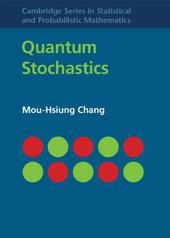
|
Quantum Stochastics
Hardback
Main Details
Description
The classical probability theory initiated by Kolmogorov and its quantum counterpart, pioneered by von Neumann, were created at about the same time in the 1930s, but development of the quantum theory has trailed far behind. Although highly appealing, the quantum theory has a steep learning curve, requiring tools from both probability and analysis and a facility for combining the two viewpoints. This book is a systematic, self-contained account of the core of quantum probability and quantum stochastic processes for graduate students and researchers. The only assumed background is knowledge of the basic theory of Hilbert spaces, bounded linear operators, and classical Markov processes. From there, the book introduces additional tools from analysis, and then builds the quantum probability framework needed to support applications to quantum control and quantum information and communication. These include quantum noise, quantum stochastic calculus, stochastic quantum differential equations, quantum Markov semigroups and processes, and large-time asymptotic behavior of quantum Markov semigroups.
Author Biography
Dr Mou-Hsiung Chang served as a Professor of Mathematical Sciences at the University of Alabama in Huntsville for twenty-eight years, where he also served as department chair for eight years, prior to joining the US Army Research Office (ARO) in 2002. He has published extensively on stochastic analysis and control and on quantum stochastics, with more than 70 refereed journal articles, 40 conference papers and technical reports, and more than 80 invited technical presentations at conferences and universities.
Reviews'This excellent introductory book on quantum stochastics is most timely - the highly interdisciplinary book needed in this century. Dr Chang has organized and presented the material in a systematic and coherent manner ... [The] material is self-contained and self-readable; ideas, concepts and topics are up-to-date, well-motivated, well presented and well associated with the classical approach: starting from the idea of a quantum system, to quantum probability space, measure, processes with quantum stochastic calculus, quantum stochastic differential equations, quantum stability, quantum semigroups, and so on. I am looking forward to using this book for my graduate course on quantum stochastic dynamic systems. I will also highly recommend it to my students and colleagues.' G. S. Ladde, University of South Florida, and founder and editor of the Journal of Stochastic Analysis and Applications 'Mou-Hsiung Chang's book is a comprehensive and lucid account of quantum probability and stochastics. It is a welcome and up-to-date addition to the literature on this topic and will likely become a valuable reference for both experts and graduate students interested in specializing in this field.' Daniel Lidar, University of Southern California 'Although introduced at the same time as its standard (axiomatic) counterpart, quantum probability took almost half a century to become popular, first with physicists and then more broadly. The early books documenting this progress - by Meyer and by Accardi, Frigerio, and Lewis - targeted mostly theorists. Fortunately, this new arrival, by Mou-Hsiung Chang, speaks to a much larger readership. The book is very well written and appears to be accessible to a broad audience, including engineers, applied mathematicians, and physicists.' Boris Rozovsky, Ford Foundation Professor of Applied Mathematics, Brown University 'The book by Mou-Hsiung Chang falls in the original spirit of the field, i.e. it focuses on the mathematical aspects of open quantum dynamics. As such, the book is mathematically rigorous, at least for the topics it touches. The first two chapters formally introduce operator theory and quantum probability theory. All fundamental elements of quantum mechanics and the corresponding mathematical structures are discussed in details. ... there are a large number of important topics covered in this book, including dynamical semigroups, master equations, Markov processes, recurrence and transience and ergodic theory.' Kavan Modi, Contemporary Physics
|